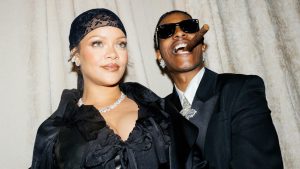www.vulture.com_article_sabrina-carpenter-album-cover-controversy.html
Article Title: Sabrina Carpenter’s Album Art Controversy, Explained
Article Content:
Save this article to read it later.
Find this story in your account’s‘Saved for Later’section.
The cover of Sabrina Carpenter’s forthcoming albumMan’s Best Friendfeatures the singer on her knees, pawing for attention at an anonymous man who has his hand grippingher hair. The high-contrast, filmic quality of the image cover calls to mind — aside from the obvious dog-like imagery —an old photoshootof French singer and actor Serge Gainsbourg and his then-wife, British actor Jane Birkin. While much of Carpenter’s music has gestured towards sexuality through euphemism, there’s a more obvious sentiment on display here. A new Carpenter album ought to be, on its face, a good thing:“Espresso” sat comfortably on the charts last year,her tour was an often-viral success, and her appearance onSNL50with Paul Simon cemented her as the type of pop star who can hang with the legends. We had reason enough to both take her seriouslyandtake her lightly. Unfortunately, however, far more of the former seems to be happening than the latter. Upon announcement of the new album and its imagery, a debate broke out on Twitter — and subsequently Reddit — over whatexactlyCarpenter purportedly stands (or kneels) for.
What people take an issue with when it comes to Carpenter is the hypersexualization that exists around her musical universe. She is too sexual — in look, styling, and references — and her music is too male-centric in content, form, and visuals. These complaints, however, are one in the same: a kind of abject judgment on what audiences deem as acceptable for a public figure. The ethos Carpenter most consistently gestures towards is the poignant and funny misery that can be attributed to dating men. She can wear lingerie on stage or get down on her knees on an album cover, but it doesn’t change the content of what her songs are about. Carpenter’s exploration of heartbreak and frustration exist alongside the performative sexuality. Sex has not saved her, but it hasn’t condemned her either, nor is it endorsing aLolita-esque plot. Carpenter is small; she makes note of this ad nauseum, but does not otherwise demean her own maturity. She instead opts for something cartoonish, exaggerated. When the Animaniacs go “hellooooooo, nurse,” they are saying thatto a cartoon that looks like Sabrina Carpenter. Her Betty Boop-esque approach to seduction might be a hallmark of her live shows, but her songs depict a more tragic reality. “I’ve never seen an ugly truth I can’t bend,” she sings on “Lie To Girls” off ofShort n’ Sweet.
As the singer put it inher June 12Rolling Stoneprofile, “I’m doing the 25-year-old thing right now, whatever that means.” (She has since turned 26 — not that that makes a big difference.) Carpenter uses this answer to deflect whether or not she’s single, but most of what the quote tells us is what many 25-year-olds have gone on to figure out. That stage of young adulthood sits at a crossroads between a kind of societal awareness and youthful impulsion. “Manchild” is about choosing what’s wrong for you, again and again, to a point of playful misery. There’s been a common refrain around Carpenter’s pop persona that originated from a now-deleted tweet from last October. “I’m 17 and AFRAID of Sabrina Carpenter when she’s performing,”the tweet said. The memed-version clipped the final three words out from that sentence, which is unfortunate because Carpenter’s overt sexuality is a performance. As Carpenter herself puts it inRolling Stone, “There’s so many more moments than the ‘Juno’ positions, but those are the ones you post every night and comment on.”
Carpenter knows she’s under scrutiny, and more than that, she knows she’s not alone. Though she tellsRolling Stonethat “every female artist” making music is under a more watchful eye right now, what the hullabaloo around her work calls to mind is Miley Cyrus’s coming-of-age discomfort aroundBangerz. Eager to shed a child star mentality, Cyrus — who shares Disney roots with Carpenter — went all out, half-clothed, barely clothed, in innuendo-laden pop songs that defiantly pushed against who people thought her to be. With Carpenter, there is no pushback against a self. She is not trying to destroy who she once was. She’s trying to grow within it, and with that growth, there is discomfort — for us, for her. That she finds fun in it at all is a minor miracle. That’s what Carpenter is doing, really, when she’s posing on her knees or rolling around on stage. “Won’t you let an innocent woman be?” she sings on “Manchild.” She’s directing it towards a lover, but it might as well be her audience.
Things you buy through our links may earnVox Mediaa commission.
Save this article to read it later.
Find this story in your account’s‘Saved for Later’section.
The cover of Sabrina Carpenter’s forthcoming albumMan’s Best Friendfeatures the singer on her knees, pawing for attention at an anonymous man who has his hand grippingher hair. The high-contrast, filmic quality of the image cover calls to mind — aside from the obvious dog-like imagery —an old photoshootof French singer and actor Serge Gainsbourg and his then-wife, British actor Jane Birkin. While much of Carpenter’s music has gestured towards sexuality through euphemism, there’s a more obvious sentiment on display here. A new Carpenter album ought to be, on its face, a good thing:“Espresso” sat comfortably on the charts last year,her tour was an often-viral success, and her appearance onSNL50with Paul Simon cemented her as the type of pop star who can hang with the legends. We had reason enough to both take her seriouslyandtake her lightly. Unfortunately, however, far more of the former seems to be happening than the latter. Upon announcement of the new album and its imagery, a debate broke out on Twitter — and subsequently Reddit — over whatexactlyCarpenter purportedly stands (or kneels) for.
What people take an issue with when it comes to Carpenter is the hypersexualization that exists around her musical universe. She is too sexual — in look, styling, and references — and her music is too male-centric in content, form, and visuals. These complaints, however, are one in the same: a kind of abject judgment on what audiences deem as acceptable for a public figure. The ethos Carpenter most consistently gestures towards is the poignant and funny misery that can be attributed to dating men. She can wear lingerie on stage or get down on her knees on an album cover, but it doesn’t change the content of what her songs are about. Carpenter’s exploration of heartbreak and frustration exist alongside the performative sexuality. Sex has not saved her, but it hasn’t condemned her either, nor is it endorsing aLolita-esque plot. Carpenter is small; she makes note of this ad nauseum, but does not otherwise demean her own maturity. She instead opts for something cartoonish, exaggerated. When the Animaniacs go “hellooooooo, nurse,” they are saying thatto a cartoon that looks like Sabrina Carpenter. Her Betty Boop-esque approach to seduction might be a hallmark of her live shows, but her songs depict a more tragic reality. “I’ve never seen an ugly truth I can’t bend,” she sings on “Lie To Girls” off ofShort n’ Sweet.
As the singer put it inher June 12Rolling Stoneprofile, “I’m doing the 25-year-old thing right now, whatever that means.” (She has since turned 26 — not that that makes a big difference.) Carpenter uses this answer to deflect whether or not she’s single, but most of what the quote tells us is what many 25-year-olds have gone on to figure out. That stage of young adulthood sits at a crossroads between a kind of societal awareness and youthful impulsion. “Manchild” is about choosing what’s wrong for you, again and again, to a point of playful misery. There’s been a common refrain around Carpenter’s pop persona that originated from a now-deleted tweet from last October. “I’m 17 and AFRAID of Sabrina Carpenter when she’s performing,”the tweet said. The memed-version clipped the final three words out from that sentence, which is unfortunate because Carpenter’s overt sexuality is a performance. As Carpenter herself puts it inRolling Stone, “There’s so many more moments than the ‘Juno’ positions, but those are the ones you post every night and comment on.”
Carpenter knows she’s under scrutiny, and more than that, she knows she’s not alone. Though she tellsRolling Stonethat “every female artist” making music is under a more watchful eye right now, what the hullabaloo around her work calls to mind is Miley Cyrus’s coming-of-age discomfort aroundBangerz. Eager to shed a child star mentality, Cyrus — who shares Disney roots with Carpenter — went all out, half-clothed, barely clothed, in innuendo-laden pop songs that defiantly pushed against who people thought her to be. With Carpenter, there is no pushback against a self. She is not trying to destroy who she once was. She’s trying to grow within it, and with that growth, there is discomfort — for us, for her. That she finds fun in it at all is a minor miracle. That’s what Carpenter is doing, really, when she’s posing on her knees or rolling around on stage. “Won’t you let an innocent woman be?” she sings on “Manchild.” She’s directing it towards a lover, but it might as well be her audience.
Things you buy through our links may earnVox Mediaa commission.
Source: Sabrina Carpenter’s Album Art Controversy, Explained








